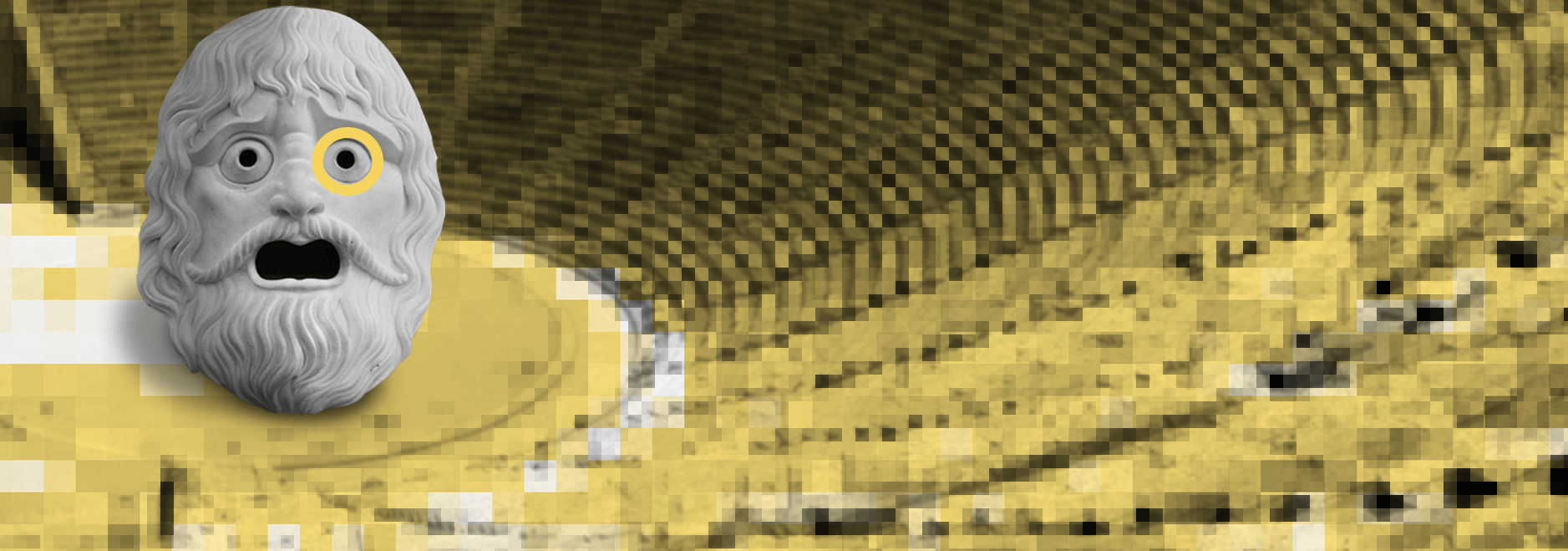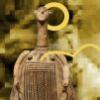The programme concerns every single human being who is still interested in finding the roots of the current social and cultural environment we call ‘western civilization’.
Ancient Greek Theatre
When we refer to ancient Greek theatre, (comedy and drama) as ‘classical’, we tend to use this term in order to denote ancient Greek theatre’s power to never stop producing reactions to people that are watching these theatrical plays and to people that still feel mentally excited when they read them.
This online course is designed carefully, so that the language and the means used efficiently provide knowledge to anyone interested in ancient Greek theatre.
The participant will have the chance to meet the giants of human civilization through a dialogue with Aristophanes, Aeschylus, Sophocles, Euripides accompanied by a presentation of their theatrical plays along with the importance of the Greek tragedy, a form of writing that had the ability to stare at the abyss of the human soul.
Let us think about a paradox: ancient Greek theatre is not so ancient and not so Greek.
It has the power to give us meaningful interpretations of our current reality and does not refer only to Greeks but concerns any given human being on earth.
All of the above will be analyzed further and in detail in this online course, part of the Arts and Culture category.
After successfully completing the lessons, the participant will receive a training certificate while acquiring a magnificent one time experience.
This programme aims to make us understand the creative power and the ingenious talent of this global revolution which today we simply call ‘ancient Greek theatre’.At the same time, these seminars will give us, (as modern western citizens), the chance to rearrange our understanding of our current social and ideological environment through the dialogue with these giants of human civilization.The language and the means we use in our approach are designed to be accessible to any person would be interested in learning about the ancient Greek theatre, without however making any sort of intellectual or philosophical compromises. The aims of this programme are, first of all, to introduce us to some of the most brilliant and exciting theatrical plays ever been written, secondly to make us understand the way we can approach them in order to rethink our current social condition as modern western citizens and thirdly to give us the chance to find new perspectives of the civilization we call ‘western’.The course concerns every single human being who is still interested in finding the roots of the current social and cultural environment we call ‘western civilization’.
MODULE 1
Aristophanes: Laughing at the face of tyrants
Lesson 1 Aristophanes and his epoch, a historical introduction
The purpose of this unit is to familiarise us with the general social, historical and intellectual context within which Aristophanes was born, wrote and played his comedies. We will underline the basic social mentality which was the main force behind the success of ancient Athens at the 5th century BC and we will underscore the importance of the so-called ‘Old Comedy’ for the smooth function of the Athenian democracy. While we will cover all the major parameters of Aristophanes’ epoch, we will not give an ‘academic lecture’. We will, on the contrary, point out what still makes Aristophanes a viable and vivid interlocutor.
Lesson 2 ‘Knights’, the very definition of political satire
The purpose of this unit is twofold: a) we will synoptically examine the text of Aristophanes’ play ‘Knights’ and we will examine its basic story-line along with its basic characters and b) we will analyse the nature and the purpose of political satire. We will firstly define the difference between comedy and satire and the further difference between satire in general and political satire. We will, afterwards, underline the main plot of the theatrical play and we will give a critical analysis of its main characters. We will conclude with some comments on the role of political satire in our current democracy.
Lesson 3 ‘Wasps’, the nature and the abuse of ancient athenian legal system
The purpose of this unit is twofold: a) we will briefly examine the justice system of Athens at Aristophanes’ times and b) we will synoptically analyse Aristophanes’ play ‘Wasps’. We will discuss the specific nature of Athens’ legal system during 5thcentury BC, mainly focussing on its aims, scope and on its functional failings. We will also discuss the reasons that make ‘Wasps’ one of the best comedies ever written in the western culture.
Lesson 4 ‘Peace’, the heart of aristophanes’ ethics
The purposes of this unit are, on the one hand, to explore Aristophanes’ Ethics as they are deployed in his play ‘Peace’ and, on the other, to synoptically analyse this theatrical play with special focus on the historical background of its performance at 421 BC at City Dionysia.
MODULE 2
Ancient greek tragedy: having the courage to stare at the abyss of the human soul
Lesson 1 Ancient greek tragedians and the periclean democracy, a historical introduction
The purpose of this unit is to historically introduce us to the multi-dimensional inter-connections between Aeschylus, Sophocles, Euripides and the young Athenian democracy. We will, therefore synoptically discuss the social, political, intellectual and historical linkages between the beginning of the Athenian tragedy and the beginning of the Athenian democracy. What we intend to show and underline is the indisputable affinity between the political aims of the Periclean democracy and the intellectual and cultural production of the Athenian Tragedians. We will further analyse tragedy’s possible aims with the specific intention to find possible solutions to our current existential problems.
Lesson 2 Aeschylus’ ‘The suppliants’: fighting against social oppresion. the ‘natural’ rights of women
The general purpose of this unit is to analyse the theatrical play of Aeschylus ‘The Suppliants’. We will, however, further pursue to examine how Aeschylus in this play explores the social nature of the ‘natural’ limits of the women while he underscores the social need for a democratic way of taking decisions.
Our final aim will be to understand how Aeschylus ultimately argues in favour of a collective social medium, predestined for being used as a bridge between various individual conflicts
Lesson 3 Sophocles’ ‘Antigone’: love conquers everything - unwritten law - civil disobedience
The general purpose of this unit is to closely analyse Sophocles’ tragedy ‘Antigone’. We will examine play’s plot and the main characters along with some key themes and concepts which shape Sophocles’ overall design.
Lesson 4 Euripides’ ‘The Bacchae’: the nature, the limits and the power of the irrational
The general purpose of this unit is to synoptically explore, analyse and depict with accuracy the main conceptual, social, existential and philosophical themes of the theatrical play of Euripides ‘The Bacchae’. We will examine and explain the plot and the characters of the tragedy along with their mutual active interaction. We will also pay close attention to the chorus and its role to the, (relative with this tragedy), Euripidean aims.
The purpose of these seminars is to be used as a conceptual bridge between ancient Athenian culture and our modern culture. They are not thus, to be used as a strict ‘academic manual’. Therefore, our assessment method serves only the basic need for ensuring that the participants have understood the general content of the seminars. This is why we will use only closed-ended questions at the end of every thematic unity, in the type of ‘yes/no’. In the end, the participants will need to give 50% of correct answers in order to ‘pass’ the seminar.
Online and distance training learning at National and Kapodistrian University of Athens offers a new way of combining innovative learning and training techniques with interaction with your tutor and fellow trainees from around the world.
The e-learning course is implemented via a user-friendly educational platform adjusted to the Distance Learning Principles. Courses are structured as weekly online meetings; interaction with the course tutor and other trainees takes place in a digital learning environment. The courses are designed to fit around your schedule; you access the course whenever it is convenient for you, however within the given deadlines.
The whole world becomes your classroom as e-learning can be done on laptops, tablets and phones as a very mobile method. Learning can be done on the train, on a plane or even during your trip to Greece!
The educational platform is a portal that offers access to electronic educational material based on modern distance learning technologies. The computer based nature of training means new technology is being introduced all the time to help trainees engage and learn in a tailored way that will meet their needs. E-learners have access to the educational platform with their personal code number in order to browse all relevant training material and interact with their instructors.
Moreover, an online communication system through own personal e-mail account is available in order to make the process easier and more interactive. Trainees can contact directly their tutors or the administration office of the course and share any concerns or anxieties related to the course in order to make the most of their experience.
Every week e-learners are provided with the relevant material, delivered either in the form of video-lectures, text notes and relevant presentations or as a combination of them. The educational material of the course is uploaded gradually, per educational unit. During the course, important info for the smooth conduct of the educational process, such as timetables for the submission of the exercises are announced on the Announcement section of the platform.
For successful completion of the course the e-learner should have fulfill her/his academic obligations, meaning should have submitted all corresponding assessment exercises and have achieved at least an average of 50% grade in the corresponding tests for each module. The score scale ranges from 0 to 100%. Finally, if the total score on one or more lessons of the course does not exceed 50%, trainees can ask for reassessment.
During the course trainees will be attending a training experience designed by academics and lecturers from the National University of Athens as well as from other Universities, Research Institutes and Cultural organizations around Greece.
Interactivity, flexibility and our long tradition guarantee that learning with us offers a successful and rewarding experience. Finally, access to a large variety of material and online resources available in each unit aims to excite your curiosity and guide you in exploring further your favourite topic. Part of the online material can be downloaded providing the chance to quickly refresh your memory after the completion of the course.
When will I receive the Certificate?
The Certificate will be sent to you electronically 30 working days upon completion, if you have no remaining academic or financial obligations. The Certificate will be also sent to you through traditional post services. Upon request the Certificate can be sent with the use of courier services. In this case, the relative cost should be covered by your side.












